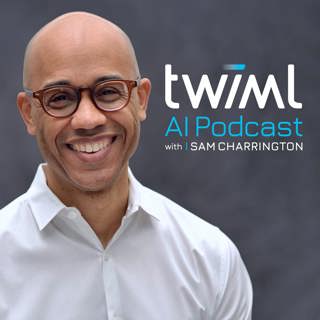
Vibe Coding's Uncanny Valley with Alexandre Pesant - #752
Today, we're joined by Alexandre Pesant, AI lead at Lovable, who joins us to discuss the evolution and practice of vibe coding. Alex shares his take on how AI is enabling a shift in software development from typing characters to expressing intent, creating a new layer of abstraction similar to how high-level code compiles to machine code. We explore the current capabilities and limitations of coding agents, the importance of context engineering, and the practices that separate successful vibe coders from frustrated ones. Alex also shares Lovable’s technical journey, from an early, complex agent architecture that failed, to a simpler workflow-based system, and back again to an agentic approach as foundation models improved. He also details the company's massive scaling challenges—like accidentally taking down GitHub—and makes the case for why robust evaluations and more expressive user interfaces are the most critical components for AI-native development tools to succeed in the near future. The complete show notes for this episode can be found at https://twimlai.com/go/752.
22 Loka 20251h 12min
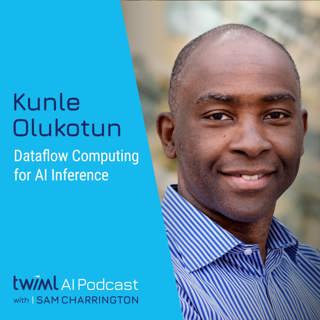
Dataflow Computing for AI Inference with Kunle Olukotun - #751
In this episode, we're joined by Kunle Olukotun, professor of electrical engineering and computer science at Stanford University and co-founder and chief technologist at Sambanova Systems, to discuss reconfigurable dataflow architectures for AI inference. Kunle explains the core idea of building computers that are dynamically configured to match the dataflow graph of an AI model, moving beyond the traditional instruction-fetch paradigm of CPUs and GPUs. We explore how this architecture is well-suited for LLM inference, reducing memory bandwidth bottlenecks and improving performance. Kunle reviews how this system also enables efficient multi-model serving and agentic workflows through its large, tiered memory and fast model-switching capabilities. Finally, we discuss his research into future dynamic reconfigurable architectures, and the use of AI agents to build compilers for new hardware. The complete show notes for this episode can be found at https://twimlai.com/go/751.
14 Loka 202557min
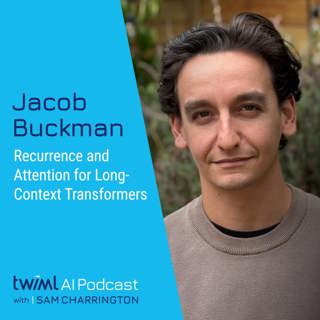
Recurrence and Attention for Long-Context Transformers with Jacob Buckman - #750
Today, we're joined by Jacob Buckman, co-founder and CEO of Manifest AI to discuss achieving long context in transformers. We discuss the bottlenecks of scaling context length and recent techniques to overcome them, including windowed attention, grouped query attention, and latent space attention. We explore the idea of weight-state balance and the weight-state FLOP ratio as a way of reasoning about the optimality of compute architectures, and we dig into the Power Retention architecture, which blends the parallelization of attention with the linear scaling of recurrence and promises speedups of >10x during training and >100x during inference. We review Manifest AI’s recent open source projects as well: Vidrial—a custom CUDA framework for building highly optimized GPU kernels in Python, and PowerCoder—a 3B-parameter coding model fine-tuned from StarCoder to use power retention. Our chat also covers the use of metrics like in-context learning curves and negative log likelihood to measure context utility, the implications of scaling laws, and the future of long context lengths in AI applications. The complete show notes for this episode can be found at https://twimlai.com/go/750.
7 Loka 202557min
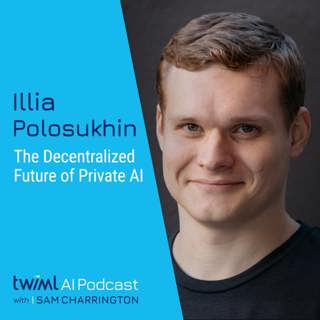
The Decentralized Future of Private AI with Illia Polosukhin - #749
In this episode, Illia Polosukhin, a co-author of the seminal "Attention Is All You Need" paper and co-founder of Near AI, joins us to discuss his vision for building private, decentralized, and user-owned AI. Illia shares his unique journey from developing the Transformer architecture at Google to building the NEAR Protocol blockchain to solve global payment challenges, and now applying those decentralized principles back to AI. We explore how Near AI is creating a decentralized cloud that leverages confidential computing, secure enclaves, and the blockchain to protect both user data and proprietary model weights. Illia also shares his three-part approach to fostering trust: open model training to eliminate hidden biases and "sleeper agents," verifiability of inference to ensure the model runs as intended, and formal verification at the invocation layer to enforce composable guarantees on AI agent actions. Finally, Illia shares his perspective on the future of open research, the role of tokenized incentive models, and the need for formal verification in building compliance and user trust. The complete show notes for this episode can be found at https://twimlai.com/go/749.
30 Syys 20251h 5min
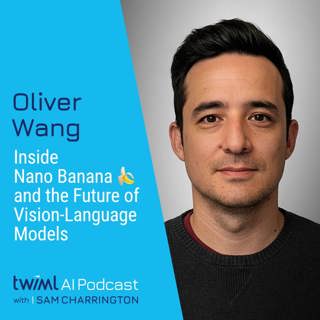
Inside Nano Banana 🍌 and the Future of Vision-Language Models with Oliver Wang - #748
Today, we’re joined by Oliver Wang, principal scientist at Google DeepMind and tech lead for Gemini 2.5 Flash Image—better known by its code name, “Nano Banana.” We dive into the development and capabilities of this newly released frontier vision-language model, beginning with the broader shift from specialized image generators to general-purpose multimodal agents that can use both visual and textual data for a variety of tasks. Oliver explains how Nano Banana can generate and iteratively edit images while maintaining consistency, and how its integration with Gemini’s world knowledge expands creative and practical use cases. We discuss the tension between aesthetics and accuracy, the relative maturity of image models compared to text-based LLMs, and scaling as a driver of progress. Oliver also shares surprising emergent behaviors, the challenges of evaluating vision-language models, and the risks of training on AI-generated data. Finally, we look ahead to interactive world models and VLMs that may one day “think” and “reason” in images. The complete show notes for this episode can be found at https://twimlai.com/go/748.
23 Syys 20251h 3min

Is It Time to Rethink LLM Pre-Training? with Aditi Raghunathan - #747
Today, we're joined by Aditi Raghunathan, assistant professor at Carnegie Mellon University, to discuss the limitations of LLMs and how we can build more adaptable and creative models. We dig into her ICML 2025 Outstanding Paper Award winner, “Roll the dice & look before you leap: Going beyond the creative limits of next-token prediction,” which examines why LLMs struggle with generating truly novel ideas. We dig into the "Roll the dice" approach, which encourages structured exploration by injecting randomness at the start of generation, and the "Look before you leap" concept, which trains models to take "leaps of thought" using alternative objectives to create more diverse and structured outputs. We also discuss Aditi’s papers exploring the counterintuitive phenomenon of "catastrophic overtraining," where training models on more data improves benchmark performance but degrades their ability to be fine-tuned for new tasks, and dig into her lab's work on creating more controllable and reliable models, including the concept of "memorization sinks," an architectural approach to isolate and enable the targeted unlearning of specific information. The complete show notes for this episode can be found at https://twimlai.com/go/747.
16 Syys 202558min

Building an Immune System for AI Generated Software with Animesh Koratana - #746
Today, we're joined by Animesh Koratana, founder and CEO of PlayerZero to discuss his team’s approach to making agentic and AI-assisted coding tools production-ready at scale. Animesh explains how rapid advances in AI-assisted coding have created an “asymmetry” where the speed of code output outpaces the maturity of processes for maintenance and support. We explore PlayerZero’s debugging and code verification platform, which uses code simulations to build a "memory bank" of past bugs and leverages an ensemble of LLMs and agents to proactively simulate and verify changes, predicting potential failures. Animesh also unpacks the underlying technology, including a semantic graph that analyzes code bases, ticketing systems, and telemetry to trace and reason through complex systems, test hypotheses, and apply reinforcement learning techniques to create an “immune system” for software. Finally, Animesh shares his perspective on the future of the software development lifecycle (SDLC), rethinking organizational workflows, and ensuring security as AI-driven tools continue to mature. The complete show notes for this episode can be found at https://twimlai.com/go/746.
9 Syys 20251h 5min
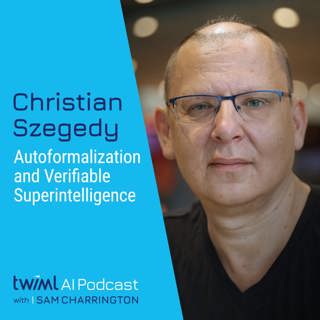
Autoformalization and Verifiable Superintelligence with Christian Szegedy - #745
In this episode, Christian Szegedy, Chief Scientist at Morph Labs, joins us to discuss how the application of formal mathematics and reasoning enables the creation of more robust and safer AI systems. A pioneer behind concepts like the Inception architecture and adversarial examples, Christian now focuses on autoformalization—the AI-driven process of translating mathematical concepts from their human-readable form into rigorously formal, machine-verifiable logic. We explore the critical distinction between the informal reasoning of current LLMs, which can be prone to errors and subversion, and the provably correct reasoning enabled by formal systems. Christian outlines how this approach provides a robust path toward AI safety and also creates the high-quality, verifiable data needed to train models capable of surpassing human scientists in specialized domains. We also delve into his predictions for achieving this superintelligence and his ultimate vision for AI as a tool that helps humanity understand itself. The complete show notes for this episode can be found at https://twimlai.com/go/745.
2 Syys 20251h 11min
